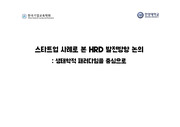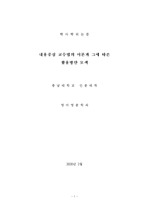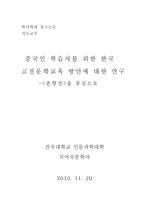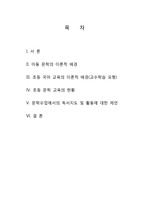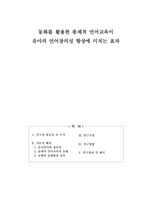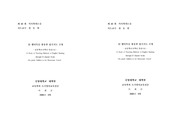

PARTNER
검증된 파트너 제휴사 자료
문학중심 총체적 언어교육 활동 개발 연구
방대한 850만건의 자료 중 주제별로 만들수 있는 최적의 산출물을 해피 캠퍼스에서 체험 하세요 전문가의 지식과 인사이트를 활용하여 쉽고 폭넓게 이해하고 적용할수 있는 기회를 놓치지 마세요
33 페이지
최초등록일 2015.03.24
최종저작일
2002.01
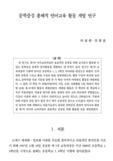
-
 * 본 문서는 배포용으로 복사 및 편집이 불가합니다.
* 본 문서는 배포용으로 복사 및 편집이 불가합니다.
미리보기
서지정보
· 발행기관 : 한국초등국어교육학회
· 수록지 정보 : 한국초등국어교육 / 20호
· 저자명 : 이성은, 오은순
목차
Ⅰ. 서론
Ⅱ. 이론적 배경
Ⅲ. 연구방법
Ⅳ. 교실적용의 결과
Ⅴ. 결론 및 제언
참고문헌초록
본 연구는 제7차 국어교육과정의 효율적인 운영을 위해 교사들이 활용할 수 있는 문학중심 총체적 언어활동을 개발하는 데 목적이 있다. 연구는 제7차 교육과정의 시행에 들어간 초등학교 1, 2, 3학년 국어과를 대상으로 하였다. 먼저 관련 문헌을 기초로 활동 구성의 틀을 설정하였으며, 활동 구성의 원리를 점검하고, 문학작품 선정 기준을 정한 후 각 학년 국어과 마당별로 활동을 개발하였다. 그 결과, 각 학년 각 단원(마당)마다 기본, 보충, 심화활동 3개, 따라서 학년별 29개, 총 87개의 활동이 개발되었다. 개발된 활동은 각 학년의 한 학급에 8주간 적용되었다. 적용을 평가한 결과, 총체적 언어 교육 원리와의 부합정도는 시간이 지남에 따라 그 수준이 안정적으로 높아진 것으로 나타났으며, 수업에 대한 아동의 반응 평가 결과 역시 매우 긍정적인 것으로 드러났다. 따라서 이상의 절차에 의해 개발되고 적용가능성이 검증된 문학중심 총체적 언어교육 활동을 제7차 국어과 교육과정의 효율적인 운영을 위해 활용할 것을 제언하였다.영어초록
The purpose of this study was to develop learning activities of The Literature-Based Whole Language Approach for effective teaching of the 7th revised curriculum in this country. The objects of this study were the 1st, 2nd, and 3rd grade of the korean language curriculum. There were three stages in the process of development. At first stage, the framework of activity was established, in the basis of the literatures related to it. The teaching and learning principles of whole language approach were scrutinized at the second stage. At the last stage, the standards for choosing the proper books were set up. As a result, three activities for each unit of every grade was developed.
totally 87 activities in cluding 29 each for basics, supplementary and enrichment.
The developed activities had been used in a language classroom of each grade during 8 weeks from August to October. The results of evaluation were positive in the degree of correspondence with the principles of whole language and in the responds from the children who participated in the classroom activities.
According to the results, this study proposed for teachers to use the developed activities for implementing effectively the korean language curriculum.참고자료
· 없음태그
-
자료후기
-
자주묻는질문의 답변을 확인해 주세요

꼭 알아주세요
-
본 학술논문은 (주)학지사와 각 학회간에 저작권계약이 체결된 것으로 AgentSoft가 제공 하고 있습니다.
본 저작물을 불법적으로 이용시는 법적인 제재가 가해질 수 있습니다. -
해피캠퍼스는 구매자와 판매자 모두가 만족하는 서비스가 되도록 노력하고 있으며, 아래의 4가지 자료환불 조건을 꼭 확인해주시기 바랍니다.
파일오류 중복자료 저작권 없음 설명과 실제 내용 불일치 파일의 다운로드가 제대로 되지 않거나 파일형식에 맞는 프로그램으로 정상 작동하지 않는 경우 다른 자료와 70% 이상 내용이 일치하는 경우 (중복임을 확인할 수 있는 근거 필요함) 인터넷의 다른 사이트, 연구기관, 학교, 서적 등의 자료를 도용한 경우 자료의 설명과 실제 자료의 내용이 일치하지 않는 경우
“한국초등국어교육”의 다른 논문도 확인해 보세요!
-
효과적인 교수․학습을 위한 교재 구성 방안 28 페이지
학교 현장에서 국어과교육의 성패를 좌우하는 것은 교재와 교수․학습 방법이다. 교사들이 학생들과 직접 대면하는 과정에서 매개체가 되는 것이 바로 교재이고, 이 교재는 국어과교육의 목표와 내용을 담고 있기 때문이다. 교재는 객관적 실체로 존재하는 것이 아니라 교사에 의해 적극적으로 수정되어 교수․학습 과정에서 역동적으로 작용해야 한다. .. -
제7차 교육과정에 따른 국어과 읽기․쓰기 수행평가 연구(Ⅰ) 31 페이지
이 연구에서는 제7차 교육과정에 따라 초등학교에서 읽기와 쓰기의 수행평가를 실제적으로 적용하는 방안에 대하여 연구하였다. 제7차 국어과 읽기 교과서에서 ‘되돌아보기’ 학습 면을 둔 것은 전체적으로 수행평가를 현실화하는데 긍정적 기여를 하고 있으나 실제로 분석해보니 단원별로 부족한 부분이 많았다. 따라서 이 연구에서는 되돌아보기 학습면을 보완한 학습지와 성.. -
초등 국어과 교수․학습 현상의 개념과 해석 모형 : 쓰기 교수․학습 현상을 중심으로 42 페이지
국어과 교수․학습 현상은 국어 현상(특수성)도 일반 교과의 교수․학습 현상(보편성)도 아니다. 국어과 교수․학습 현상(독자성)은 이 둘의 단순한 물리적 결합이 아닌 상호 교섭의 과정에 의해 만들어진 새로운 현상이다. 국어과 교수․학습 현상의 독자성은 <국어 현상으로부터 국어과 교육 과정을 거쳐 국어과 교수R.. -
창조적 국어사용과 논증문화 42 페이지
이 글은 삼단논법식, 주장보완식, 주장조화식 주장하는 글쓰기 행위가 창조적 국어사용의 한 양상임에 주목하고, 여기서 제안한 글쓰기 방식의 국어교육적 활용이 로고스 중심의 논증문화를 형성하는 기반이 될 수 있음을 살펴보았다. 창조적 국어사용은 일반적인 지적 능력과 특정 분야에 대한 구체적인 지식을 바탕으로 국어를 정확하고 유창하게 융통성 있고 독창적으로 사.. -
국어지식 교육과 문화창조 40 페이지
이 논문에서는 ‘국어지식 영역’이라는 테두리 안에서 지금까지의 문화 교육을 반성하고 앞으로 지향해야 할 방향을 찾아보았다. 국어지식 교육은 우리말에 대한 언어학적 소양을 쌓게 하고 바르고 효과적인 국어 사용을 위한 기반 지식을 확보해 주며 국어 문화를 전승하고 국어의 발전에 기여할 수 있는 태도와 자질을 닦게 하는 등 다양한 가치를 지닌다. 국어지식 영역에..
찾으시던 자료가 아닌가요?
지금 보는 자료와 연관되어 있어요!
문서 초안을 생성해주는 EasyAI

